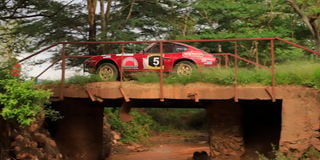WRC to undergo a raft of changes in new year to open up the sport

The Datsun 280Z of Ian Duncan and Jaspal Matharu in action around the Teita Estate in Mwatate during Day 2 of the East African Safari Classic Rally on December 11, 2023.
What you need to know:
- Locally, the Kenya National Rally Championship (KNRC) huffed and puffed through with a dwindling number of competitors, an overall reflection of the prevailing economic situation in the country when autocross in comparison thrived, defined by costs.
This is the last Wednesday of 2023, a contrasting year for the sport at the base and at the apex, which has certainly defined the direction of 2024 which starts on Monday.
Locally, the Kenya National Rally Championship (KNRC) huffed and puffed through with a dwindling number of competitors, an overall reflection of the prevailing economic situation in the country when autocross in comparison thrived, defined by costs.
With the WRC Safari only only 90 days away, 2024 will stretch the sporting arm of the event to the limit as the government sorts out finances on time.
The year was also another victory for the continent after Rwanda won the bid to host the Federation Internationale De’I Automobile (FIA) General Assembly and FIA Prize Giving Ceremony bringing together representatives from 128 countries and car clubs .
This is a culmination of high level negotiations dating back to a few years when Kenya was bidding for the Safari Rally to become more visible in the motorsport world, and hastened by Kigali’s successful hosting of international meetings hastened by the world football governing body FIFA.
On the wider perspective, the World Rally Championship (WRC) is expected to undergo a paradigm shift with a raft of changes to make the series more affordable, attractive and widely contested.
The (FIA) is aware of the fledgling fortunes of the WRC which few representation of manufacturer teams as had been in the past, directing the World Motor Sports Council (WMSC) to shift attention to a more affordable championships while finding a middle level ground between the apex Rally 1 category and Rally 2.
WMSC also appointed Dave Richards and Safari Rally winning navigator Robert Reid who serves as the federation’s Deputy President for Sports to investigate and come up with proposals which will make the WRC open to all stakeholders.
WMSC agreed to a WRC Commission proposal to allow Rally1 cars to compete on WRC events without running the standard plug-in hybrid system. While these cars will not count towards manufacturers’ championship points, this will open doors for more drivers to drive these non-hybrid machines.
The WRC Commission agreed that these cars will have to carry the equivalent weight of the full EV system in ballast and won’t be eligible for manufacturers’ championship points.
Running without the 100kW Compact Dynamics hybrid unit will result in a reduction of approximately 100 horsepower compared to a 500 horsepower hybrid-powered Rally1 car. However, it will also offer reduction in costs for competitors and also opens the doors for Rally1 cars previously a preserve for manufacturers to enter them in the WRC.to compete in regional rallies.
FIA road sport director Andrew Wheately believes the decision will help bridge the gap between Rally2 and Rally1. “The option for drivers to compete in Rally1 cars without the hybrid unit now exists,” said Wheately. “It essentially creates a step between Rally2 and Rally1 and it’s something the manufacturers have supported,” he said.
The decision is among a raft of changes ratified for the WRC season, including a move to limit teams to using a maximum of three new hybrid units in 2024 – compared to the previous nine - to reduce the cost of competing.
“Cost-saving is an ongoing process and due to the performance and reliability of the hybrid units, we can pass on a substantial cost saving to the teams by reducing the number of hybrid units from nine to three,” Wheatley added.
The other major change is the introduction of a new points scoring system that will see championship points attributed after Saturday’s leg and new allocation of points specifically for Sunday, in a bid to spice up the final day of rallies.
Under the new system, the sliding scale of 18-15-13-10-8-6-4-3-2-1 points will be awarded at the end of Saturday’s final classification, but only if a crew reaches the final classification of the rally at the end of Sunday. If a crew fails to finish on Sunday, the Saturday points will be awarded to the next best-placed pairing.
Championship points will also be awarded specifically on Sunday’s performance. The prime reason for the introduction of this points system is to prevent drivers from cruising through Sunday’s stages and preserving tyres for the end-of-rally Power Stage. Competitors will battle for a maximum of seven points on Sunday, with points awarded to the top seven competitors in a 7-6-5-4-3-2-1 sliding scale. It was also announced that drivers will no longer incur a five-minute penalty for changing an engine between pre-rally scrutineering and the first time control.




